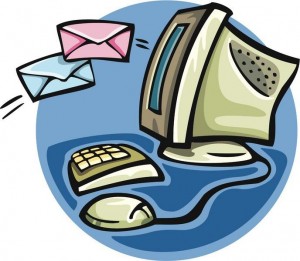Most companies today rely heavily on the use of email. Emailing is a very fast and cost effective form of communication for many different types of businesses.
Most companies use it as their main source of communication between employees. In fact, most employers do not realize the risk of using email.
Some risks range from viruses, hackers, to someone else just trying to gain a little information.
Here’s an overview of the most common email security threats in today’s Internet world.
Viruses
 Viruses cause billions of dollars in damage to businesses every year.
Viruses cause billions of dollars in damage to businesses every year.
Many corporate email systems are still quite vulnerable to viruses. In fact, in last year alone, an estimated 63 distinct email virus attacks hit the United States. These attacks come quickly and can spread quickly.
They mainly cause slowdowns across the internet. However some have been known to take down major corporation’s entire email systems.
Today’s viruses are very complex and often appear to be harmless such as personal notes, jokes, or promotions. While most viruses require recipients to download attachments in order to initiate infection and spread, some are designed to launch automatically with absolutely no user action required.
Spam
Studies have shown that 20 percent of corporate email is spam. A company that has a thousand employees could receive over two billion spam emails in a full year.
Most do not realize it until a lack of productivity ends up costing the companies billions of dollars each year.
While most spam is just annoying, some of it can be very dangerous. Most trick employees into opening malicious emails to spread faster. Also, many hackers have begun disguising viruses as spam.
Phishing
Phishing is used to trick a person into thinking the email is legit and came from a real website, usually asking the person to verify their password or to change some sort of account information.
Then, taking them to a fake website and stealing what you have typed in. This is the number one way people get their identity and personal information stolen.
Spyware
The main purpose of spyware is to install itself on the victim’s computer. It monitors all key strokes and mouse clicks so that they can later go back and collect usernames, passwords, credit card numbers and bank account numbers.
These infections can stay installed on computers for many months without an antivirus picking them up. Most are detected and removed instantly if the user keeps their antivirus up to date.
Having a great antivirus that scans files as well as emails can help prevent virus attacks, phishing and spyware.
Users should also have an up to date spam filter that prevents the infection from getting to your inbox to begin with. And most importantly never open an email attachment you didn’t specifically request.
Also, pay attention to links inside emails that appear legitimate. Many times, phishers will send you an email that looks like it came from an official source. After clicking the links, you’re redirected to a site on the hacker’s network. This is often used to collect personal information and passwords.
